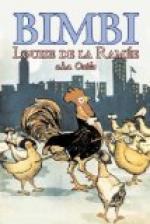Once a traveling peddler had told them that the letters on it meant Augustin Hirschvogel, and that Hirschvogel had been a great German potter and painter, like his father before him, in the art-sanctified city of Nurnberg, and had made many such stoves, that were all miracles of beauty and of workmanship, putting all his heart and his soul and his faith into his labors, as the men of those earlier ages did, and thinking but little of gold or praise.
An old trader, too, who sold curiosities not far from the church, had told August a little more about the brave family of Hirschvogel, whose houses can be seen in Nuremberg to this day; of old Veit, the first of them, who painted the Gothic windows of St. Sebald with the marriage of the margravine; of his sons and of his grand-sons, potters, painters, engravers all, and chief of them great Augustin, the Luca della Robbia of the North. And August’s imagination, always quick, had made a living personage out of these few records, and saw Hirschvogel as though he were in the flesh walking up and down the Maximilian-Strass in his visit to Innspruck, and maturing beautiful things in his brain as he stood on the bridge and gazed on the emerald green flood of the Inn.
So the stove had got to be called Hirschvogel in the family, as if it were a living creature, and little August was very proud because he had been named after that famous old dead German who had had the genius to make so glorious a thing. All the children loved the stove, but with August the love of it was a passion; and in his secret heart he used to say to himself, “When I am a man, I will make just such things too, and then I will set Hirschvogel in a beautiful room in a house that I will build myself in Innspruck just outside the gates, where the chestnuts are, by the river; that is what I will do when I am a man.”
For August, a salt baker’s son and a little cow-keeper when he was anything, was a dreamer of dreams, and when he was upon the high alps with his cattle, with the stillness and the sky around him, was quite certain that he would live for greater things than driving the herds up when the springtide came among the blue sea of gentians, or toiling down in the town with wood and with timber as his father and grandfather did every day of their lives. He was a strong and healthy little fellow, fed on the free mountain air, and he was very happy, and loved his family devotedly, and was as active as a squirrel and as playful as a hare; but he kept his thoughts to himself, and some of them went a very long way for a little boy who was only one among many, and to whom nobody had ever paid any attention except to teach him his letters and tell him to fear God. August in winter was only a little, hungry schoolboy, trotting to be catechised by the priest, or to bring the loaves from the bakehouse, or to carry his father’s boots to the cobbler; and in summer he was only one of hundreds of cowboys, who drove the poor, half-blind,




